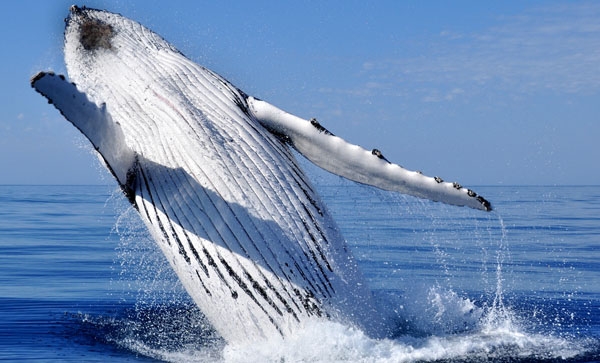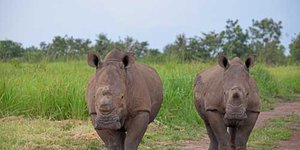Like this article?
Go on, give it a kudu!

Published on July 14 2013
Written by:
Fran
607 views
There is a reason why both locals and tourists are flocking to South Africa’s southern and eastern coastline, despite the winter cold: its whale watching season! This year, whale enthusiasts were treated to an early arrival as the Humpback and the Southern Right Whale made their way to the coast in early June. The excitement is all happening where two of the world’s most acclaimed oceans meet – the Atlantic and Indian oceans. Continued along South Africa’s coastline is the Whale Route, stretching between the country’s two major coastal cities, Cape Town and Durban.
Every year, the whales embark on an incredible journey. Leaving the icy yet food rich waters of Antarctica, they head to the warmer South African climate covering a distance of 4,500 miles. In exchange for leaving the summer feeding grounds, the warmer South African waters offer the opportunity for safe calving and nursing with few predators around so close to the shore. The whales can easily spend up to five months around South Africa’s coastal tip waiting for their calves to grow strong enough for the journey back home.
Further away from the shores we find the Bryde’s whale. Bryde’s are the lesser known whales and research to date has focused less on this whale – partly because the Bryde’s whale is spotted less often. These almost slender whales are found in deeper offshore waters but many whale watching cruises report sightings around South Africa’s coastline.
The whale watching season also serves to extend an important conservation message: how we are living in conflict with the marine environment. Whales are among the most endangered marine species and some whales, like the Southern Right whale came very close to complete extinction. In 1940, the South African population of Southern Right whales consisted of a mere 100 whales. Population growth, although slow, has been steady ever since this low point. Whales mature very slowly, contributing to the slow population growth. The modern day cause of the high whale mortality rate is directly due to human activities – collisions with large vessels and deaths caused by entangling with commercial fishing gear. Sadly, it is during the annual whale migration and nursing times that the highest mortality rates occur. Conservation scientists to date are struggling to succeed in conservation efforts, and overall, whale numbers continue to plummet.
But the annual whale watching season is a flicker of hope. By attracting crowds with their ocean frolicking, the whale watching season is the best time for both enjoying and learning about these giants of the ocean. On the topic of whale watching spots, South Africa offers among the best whale watching places in the world. The coastal town of Hermanus is arguably one of the best whale watching places in the world. With cliffs offering good sightings over the ocean and whales favoring the near shore waters, whale watchers are in for a treat in Hermanus. Hermanus is also well-known for its Whale Crier, calling on his kelp horn to announce whale sightings. Every year in September, people from across South Africa and the rest of the world, travel to Hermanus for the annual Whale Festival. It is South Africa’s only enviro-arts festival, combining the presence of the ocean giants with marine and whale awareness and festivities. Celebrating the epic two-month journey of the whales between Antarctica and South Africa, and urging their safekeeping for many more generations of whale watching.
Has been on: 11 safaris
Seeing beyond the average tourist routes and experiencing local life is my type of travel! Living in South Africa I'm an environmentalist at heart, and I continue to marvel at the beauty of the African continent.
© Your African Safari Ltd, All rights reserved.
Your African Safari is a safari-planning and safari review site. It was created to help support a healthy African wildlife population. All reviews are vetted before being approved and only ethical tours are published

Garamba National Park—an anchor of hope in the Democratic Republic of Congo
Published on January 09 2025
By: R.W.

Namibia imposes new visa requirements
Published on July 25 2024
By: yourafricansafari.com

Do I really need travel insurance or travel protection for my safari?
Published on July 30 2024
By: yourafricansafari.com